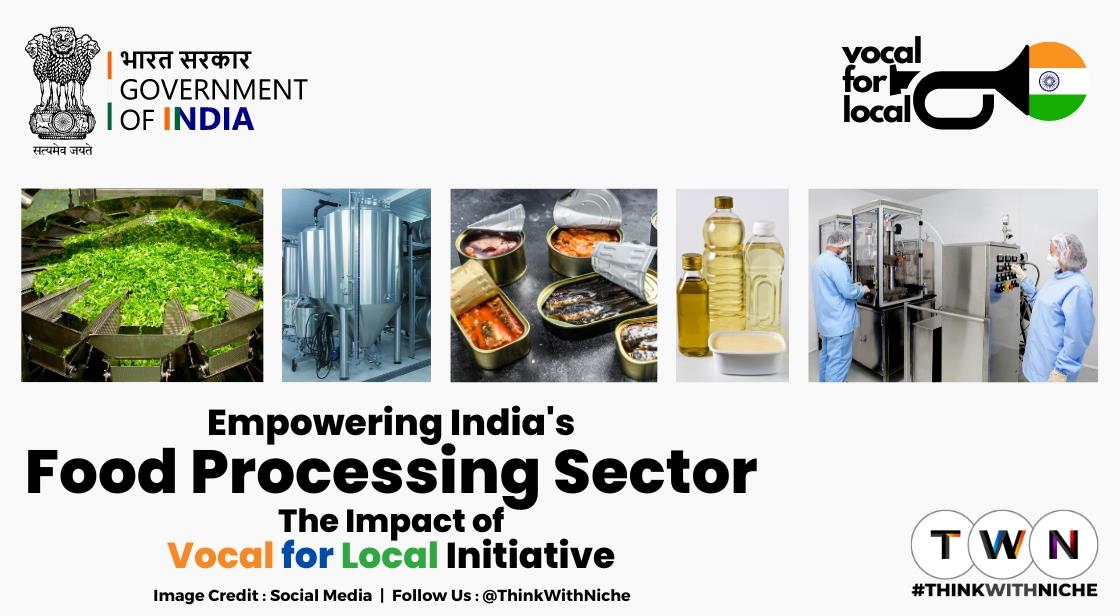Empowering India's Food Processing Sector-The Impact Of Vocal For Local Initiative

Blog Post
Revolutionizing India's Food Processing Sector-The Power of Vocal for Local. India's food processing sector has been experiencing significant growth, thanks in part to the Vocal for Local Initiative launched under the Atmanirbhar Bharat Abhiyan. Through the PM Formalization of Micro food processing Enterprises (PMFME) Scheme, micro food processing enterprises across the country are receiving financial, technical, and business support. This initiative is not only promoting self-reliance but also creating new employment opportunities and boosting India's global competitiveness.
The PMFME Scheme, with an outlay of US$ 1.21 billion, is proving to be a game-changer for India's food processing sector. It aims to formalize the unorganized segment of the food processing industry by enhancing the competitiveness of new and existing micro-enterprises. The assistance provided includes support for individual or group category micro-enterprises, seed capital for Self-Help Groups (SHGs), funding for common infrastructure, branding and marketing support, and capacity building and training.
As of now, 27,003 loans have been sanctioned under the credit-linked subsidy component of the PMFME Scheme, with 5,864 loans being sanctioned in Maharashtra alone. This ambitious initiative is transforming the sector by enabling entrepreneurs to set up or upgrade their food processing units, providing subsidies, concessional credit, and grants for technology upgradation, among other provisions.
The Vocal for Local Initiative, through the PMFME Scheme, has made a substantial impact on India's food processing sector. It has created jobs, boosted self-reliance, enhanced quality and safety standards, encouraged innovation, increased exports, strengthened the rural economy, and contributed to sustainable agricultural growth.
The Vocal for Local Initiative is playing a crucial role in transforming India's food processing sector. By fostering a culture of self-reliance, innovation, and competitiveness, the initiative is unlocking the sector's potential and paving the way for long -term growth. As India continues to invest in its food processing industry, the country is well on its way to becoming a global powerhouse in the sector and a shining example of how local initiatives can drive national progress.
By supporting micro-food processing enterprises and empowering them with the resources and support they need, the Vocal for Local Initiative is helping to create a robust food processing ecosystem in India. This ecosystem, in turn, can contribute to the nation's economic development and promote inclusive growth, particularly in rural areas where most of these enterprises are based.
Moving forward, it is essential for the government, industry stakeholders, and entrepreneurs to continue working together to overcome the challenges faced by India's food processing sector. These challenges include inadequate infrastructure, outdated technology, limited access to credit, and regulatory hurdles. Addressing these challenges will help ensure the sustainability and continued growth of India's food processing industry.
Furthermore, as the world becomes more interconnected, it is crucial for India's food processing sector to adapt to changing consumer preferences and global food trends. Embracing innovative solutions, such as digitalization, automation, and sustainable practices, can help Indian food processors stay competitive in the international market while also meeting the needs of the domestic consumer base.
In the long run, the Vocal for Local Initiative, through the PMFME Scheme and other supporting policies, has the potential to transform India's food processing sector into a model for other developing countries. By focusing on the growth and development of micro food processing enterprises, India is demonstrating that prioritizing local industries can lead to significant benefits on both a national and global scale.
In summary, the Vocal for Local Initiative has had a transformative impact on India's food processing sector. By promoting self-reliance, innovation, and competitiveness, the initiative has set the stage for long-term growth and established India as a force to be reckoned with in the global food processing industry. Continued support and investment in this sector will ensure that India remains at the forefront of the global food processing landscape and continues to reap the benefits of a strong, self-reliant food processing ecosystem.
In recent years, India's food processing sector has emerged as a key driver of the country's economic growth. The Vocal for Local Initiative, launched as part of the Atmanirbhar Bharat Abhiyan, has been instrumental in unlocking the potential of this sector.
Through the PM Formalization of Micro food processing Enterprises (PMFME) Scheme, the Ministry of Food Processing Industries (MoFPI) is providing financial, technical, and business support to micro food processing enterprises across the country.
Empowering India's Food Processing Sector- The Impact Of Vocal For Local Initiative
This initiative is not only fostering a culture of self-reliance but also creating new employment opportunities and boosting India's global competitiveness.
The PMFME Scheme: A Game-Changer for India's Food Processing Sector
The PMFME Scheme, operational from 2020-21 to 2024-25, has an outlay of US$ 1.21 billion. This ambitious initiative aims to formalize the unorganized segment of the food processing industry by enhancing the competitiveness of new and existing micro-enterprises.
As of now, 27,003 loans have been sanctioned under the credit-linked subsidy component of the PMFME Scheme, with 5,864 loans being sanctioned in Maharashtra alone.
The assistance provided under the scheme includes:
-
Support for individual or group category micro-enterprises: Financial assistance is being extended to entrepreneurs looking to set up or upgrade their food processing units. This support includes subsidies, concessional credit, and grants for technology upgradation, among other provisions.
-
Support to Self-Help Groups (SHGs) for seed capital: The scheme offers seed capital assistance to SHGs, enabling them to kickstart their food processing ventures and generate sustainable livelihoods for their members.
-
Support for common infrastructure: To enhance the efficiency and productivity of micro food processing units, the PMFME Scheme provides funding for the development of common infrastructure facilities such as cold storage, warehousing, and testing laboratories.
-
Branding and marketing support: The scheme offers assistance for branding and marketing activities, enabling micro food processing enterprises to create a strong brand identity and gain visibility in the market.
-
Capacity building and training: To ensure the long-term success of micro food processing units, the PMFME Scheme offers capacity building and training programs for entrepreneurs and workers. These programs cover various aspects of food processing, including food safety, quality assurance, and business management.
Also Read: An Overview Of Transport Sector In India
The Impact of Vocal for Local Initiative on India's Food Processing Sector
The Vocal for Local Initiative, through the PMFME Scheme, has had a significant impact on India's food processing sector. By promoting self-reliance and encouraging innovation, the initiative is fostering a competitive and resilient food processing ecosystem in the country.
-
Job Creation: The formalization of micro-food processing enterprises has led to the creation of new employment opportunities, both directly and indirectly, across the food processing value chain.
- Boosting Self-Reliance: By supporting local food processing units, the Vocal for Local Initiative is reducing India's reliance on imported food products and strengthening the country's self-sufficiency in the food sector.
-
Enhancing Quality and Safety Standards: The capacity building and training programs offered under the PMFME Scheme are helping to improve the quality and safety standards of food products manufactured by micro-enterprises. This, in turn, is enhancing consumer confidence in locally produced food products and driving demand.
-
Encouraging Innovation: The PMFME Scheme is promoting a culture of innovation among micro-food processing enterprises by providing them with the necessary resources and support to adopt new technologies and business practices. This is enabling these enterprises to improve their productivity, efficiency, and competitiveness in the market.
-
Boosting Exports: The Vocal for Local Initiative is paving the way for India's food processing sector to tap into global markets. By promoting the formalization of the sector and enhancing the quality of products, the initiative is enabling Indian food processors to meet international standards and boost exports.
-
Strengthening the Rural Economy: The PMFME Scheme has had a significant impact on rural areas, where a majority of India's food processing units are located. The scheme is not only generating employment opportunities for rural communities but also supporting the growth of ancillary industries, such as packaging, logistics, and cold chain infrastructure.
-
Sustainable Agricultural Growth: The Vocal for Local Initiative is contributing to sustainable agricultural growth by providing farmers with an assured market for their produce. This is encouraging them to adopt better farming practices, resulting in higher crop yields and improved farm incomes.
Conclusion
The Vocal for Local Initiative, through the PMFME Scheme, is playing a crucial role in transforming India's food processing sector.
By fostering a culture of self-reliance, innovation, and competitiveness, the initiative is helping to unlock the sector's potential and set the stage for long-term growth.
As India continues to invest in its food processing industry, the country is well on its way to becoming a global powerhouse in the sector and a shining example of how local initiatives can drive national progress.
You May Like
EDITOR’S CHOICE












